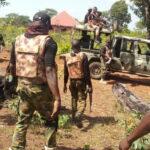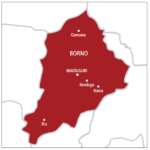When the deradicalisation exercise of ex-Boko Haram members started, it generated a lot of controversy. The idea started as part of Nigeria’s Operation Safe Corridor, aimed at facilitating the rehabilitation of ex-insurgents and reintegrating them back into the society. The initiative was first proposed at the Nigerian National Security Council meeting in September 2015, after which repentant Boko Haram members were encouraged to surrender and embrace peace.
However, many faulted the plan because, according to them, the Boko Haram war was still waging, and will, therefore, be counterproductive to begin with.
But some persons welcomed it as part of the carrot and stick approach of the government towards ending the over 15-year old Boko Haram insurgency that has claimed thousands of lives, displaced millions and disrupted the economy.
The exercise, however, took off despite the opposition among a section of the stakeholders. During their stay at the deradicalisation camps such as the one in Gombe, the ex-Boko Haram members were subjected to a combination of psychotherapy, art therapy and psycho-spiritual counselling. They were also enrolled in skills acquisition programmes, offered certificates of ‘psychosocial normalcy’ and then reintegrated into the society.
- Residents abandon houses, farms as strange insects threaten Ondo community
- FCT: Operator of dambe sports centre, 30 others arrested in Dei-Dei
Tellingly, the fears that have long been expressed by many about the Boko Haram deradicalisation exercise manifested itself with the attempted attack on a police station at Ibrahim Taiwo Police Headquarters, the area command and divisional headquarters, along Baga Road in Maiduguri, Borno State on Tuesday, March 30, 2024. On that day, some ex-Boko Haram members, who had repented and undergone the process of deradicalisation, launched an attack in an attempt to free some of their colleagues who were earlier arrested for possession of drugs and other crimes.
It is worthy of note that on January 24, 2024, the Chief of Defence Staff, Gen. Christopher Musa, had announced that 1,935 ex-Boko Haram terrorists were released back to communities from the Bulumkutu camp in Maiduguri, Borno State, between 2016 and 2022.
So many rehabilitated Boko Haram members have been previously involved in one form of crime or another. For example, in March 2023, one Alayi Madu was arrested along the Abuja-Kaduna Expressway, with 10 kilograms of skunk. Madu was said to have bought the illegal drug in Ibadan, Oyo State, and was taking the consignment concealed in a sack to Maiduguri, Borno State. In the same year, troops of the 152 Battalion, Operation Hadin Kai, in Banki, Borno State, arrested a repentant Boko Haram terrorist, Ba’ana Bdiya, also known as ‘Manci’, who was accused of providing information to his former colleagues, Goni Farouq and Amir Zabu (The executioner), both of them top former commanders of Boko Haram. Their phone conversation was intercepted in which they were planning attacks against troops.
In May 2023, the police also arrested two repentant Boko Haram members; one of them was Baba-Goni Mohammed Ibrahim, for stealing property worth N170, 000 in Maiduguri. On September 12, 2023, another ex-Boko Haram member, Dauda Musa was arrested for killing his ex-wife on her farm.
Those who argued against releasing the ex-Boko Haram militants are now made to feel vindicated as they had warned that many of the former insurgents would re-join the terror group. They said this was partly responsible for the inability of the Nigerian security forces to end the crisis.
One of such voices was Senator Ali Ndume, who said some four years ago in 2020: “I am in disagreement with the government on the issue of deradicalising and reintegration (repentant Boko Haram members). I still maintain that. You can’t be resettling people, pampering them while the war is on”.
A former Director of the Department of State Services, Mike Ejiofor, also made the same argument. He said “The deradicalisation exercise is not well-thought-out and is ill-timed. This is not the right time. It is not needed at this time because the war is still raging – we have not won the war. It is only when you have won the war that you can start thinking about amnesty for repentant people and not in the heat of the war.”
So, this attack by ex-members of Boko Haram has clearly shown that the programme has failed to achieve the purpose for which it was initiated and something urgent needs to be done. The relevant authority must act fast and nip the problem in the bud. Failure to do this can only lead to the emergence of another set of criminals.
We believe that we should have allowed the law to take its course, and prosecute those who need to be prosecuted. The deradicalisation exercise, which has angered many that lost their loved ones to these so-called repentant insurgents, is giving the former fighters a sense of entitlement.
The policy must, therefore, be reviewed as soon as possible. It should not be a time for blame games. Each and every stakeholder should play his part in returning our society to its glorious past. All efforts need to be put in defeating the terrorists and concluding the war, so that the recalcitrant among them will not have a safe haven to return to.

 Join Daily Trust WhatsApp Community For Quick Access To News and Happenings Around You.
Join Daily Trust WhatsApp Community For Quick Access To News and Happenings Around You.


